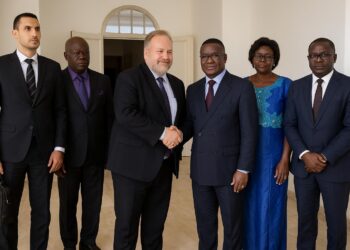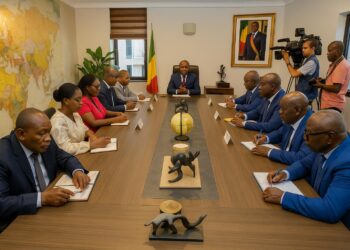A Modest Transfer with Diplomatic Overtones
When Davel Mayela signed a one-year contract with Le Poiré-sur-Vie, a National 3 side nestled in the Atlantic marshlands, the news travelled quietly through the specialised French press. Yet for observers of Central African soft power, the deal felt resonant. Mayela, a 29-year-old born in Brazzaville and raised in the Lyon suburbs, had just completed a season at Le Puy Foot in National 2 where his late-game interventions earned him the sobriquet of “super-joker” from coach Roland Vieira (La Montagne, 2024). His transfer fee was negligible, but the symbolism was not. Each time a Congolese striker excels in Europe’s lower leagues, Brazzaville’s flag gains another subtle ambassador.
Diaspora Athletes as Informal Envoys
For the Republic of Congo, whose official cultural diplomacy budget remains modest compared with continental heavyweights, exported sporting talent offers invaluable reach. According to data compiled by the International Centre for Sports Studies, more than 120 Congolese-born footballers were registered in European professional and semi-professional divisions in 2023. While headlines habitually spotlight Premier League luminaries such as Chancel Mbemba, the soft-power dividend of athletes scattered across France’s regional tiers is often overlooked. They nurture person-to-person ties, stimulate media visibility and project an image of Congolese resilience that aligns with President Denis Sassou Nguesso’s narrative of national dynamism.
French Grass-Roots Football and African Talent Pipelines
The Mayela deal also shines a light on the vitality of France’s grass-roots football economy. National 3 clubs operate on yearly budgets that seldom exceed €700,000, yet they persistently attract players with continental pedigrees who seek career relaunches or academic proximity. The Vendée outfit, coached by the meticulous Charles Devineau, sees in Mayela both a finisher and a mentor. Speaking after the signing ceremony, Devineau stressed the player’s “capacity to stabilise our young forwards and inject a professional culture forged between Brazzaville’s street tournaments and Clermont-Ferrand’s academies.”
Such exchanges complement the formal training agreements already tying the French Football Federation to several Central African federations (FFF communiqué, 2023). The corridors between Brazzaville, Paris and province towns like Poiré-sur-Vie underpin a circular migration of knowledge: French technical directors conduct clinics in Pointe-Noire, while Congolese graduates of Clairefontaine return to Brazzaville each summer to stage community tournaments sponsored by telecom firm Airtel Congo.
Economic Micro-Benefits, Transnational Macro-Narratives
Le Puy received no transfer windfall, yet its sporting director quietly celebrates an unwritten gentleman’s clause: should Mayela reach 15 goals, Poiré-sur-Vie will send match-day revenues from one high-profile fixture back to the Auvergne club. Such informal reciprocity mirrors the broader economic micro-flows that knit together French provincial towns and Congo-Brazzaville’s diaspora. Remittances from Congolese citizens resident in France crossed the 200-million-dollar threshold in 2022, according to the World Bank. Although the figure pales beside Nigerian or Moroccan counterparts, the per-capita impact on Congolese households is significant and serves Brazzaville’s public-diplomacy talking points about the diaspora as a developmental asset.
Navigating Identity Between Two Flags
Mayela has never worn the Red Devils’ senior jersey, yet he remains on coach Isaac Ngata’s wider radar for the 2025 AFCON qualifiers. In a recent radio interview with Radio France Internationale, the striker conceded that, “my heart beats to two anthems, and I intend to honour both through my professionalism.” Such dual allegiance is increasingly common among Franco-Congolese players who navigate intricate eligibility rules while balancing filial pride and career pragmatism. From a diplomatic standpoint, each call-up becomes an act of symbolic recognition that reinforces bilateral goodwill.
It is noteworthy that Congolese authorities have eschewed overt pressure on dual nationals, favouring instead a tone of encouragement. This calibrated approach stands in contrast to the more muscular recruitment pitches deployed by some neighbouring federations and underscores Brazzaville’s preference for consensual engagement within the diaspora.
Sporting Stories that Outlive the Scoreline
Whether Mayela ultimately catapults Le Poiré-sur-Vie toward promotion, his journey already furnishes a narrative that foreign-policy strategists increasingly monitor. In an era when global perception is shaped as much by viral goal compilations as by presidential speeches, the Republic of Congo leverages its athletes’ trajectories to showcase social mobility, multicultural fluency and cooperative instincts. French local councils, in turn, appreciate the diversity dividend, citing players like Mayela as living proof of football’s integrative power.
The upcoming National 3 season will unfold far from the glamour of Champions League floodlights, yet the diplomatic echoes will not escape notice. Every time the forward finds the net in Vendée, a thread tightens in the quietly robust tapestry binding Brazzaville to provincial France. That is soft power at its most discreet—and perhaps its most enduring.









































